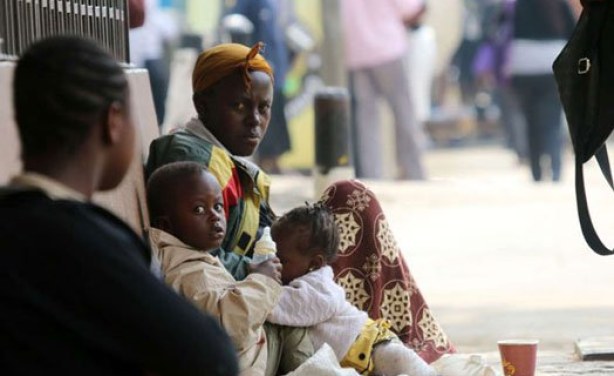In today’s world, we are confronted with a multitude of challenges, spanning from conflicts and instability in various regions to widespread poverty, malnutrition, and the escalating impacts of climate change. As I walk home one evening, I am struck by the poignant sight of a woman carrying her child, pleading for assistance from passing vehicles amidst the bustling traffic of Nairobi’s busy streets. Virginia Wanjiru, a 28-year-old woman who has called the streets home for the past 18 years.
With her one-year-old son, Mwangi, securely tied to her back, Virginia navigates the chaos of traffic, earnestly pleading with occupants for assistance—be it in the form of money, food, or any semblance of support. Her determination is palpable, but beneath the surface lies a story of vulnerability and hardship. Virginia’s situation sheds light on the harsh conditions faced by women living on the streets. Subjected to physical abuse, sexual harassment, rape, and the constant threat of police brutality, they grapple with formidable challenges. Lacking proper documentation, many find themselves ensnared in a cycle of despair, with some losing their children to traffickers or awakening to pregnancies of unknown origin, often leading to unsafe abortions and health complications.
A 2018 National Census of Street Families Report by the Ministry of Labour And Social Protection found that 46,639 persons live on the streets across Kenya. Of these, 72.4 per cent were men and 27.6 per cent women. But only 7,206 had been rehabilitated. Of these, 16 per cent were men and only eight per cent were women, leaving women like Virginia largely forgotten and neglected.
As the world celebrates International Women’s Day, it is imperative that we turn our attention to the plight of these vulnerable women. Government intervention has been insufficient, leaving many to fend for themselves in the shadows of society. Forced into desperate measures such as sex work, these women yearn for a glimmer of hope and assistance to escape their dire circumstances.
Basic necessities like sanitary pads and healthcare remain elusive, exacerbating their already precarious situation. Virginia’s story serves as a stark reminder of the daily struggles faced by street families, with the looming threat of violence and exploitation ever-present. The aspirations of these women extend beyond the harsh realities of street life. Their fervent hope is that compassionate individuals will guide them towards a path promising a better life.
As I sit with Virginia into the night, her resilience is evident despite the dangers lurking in the darkness. The chilling cold and constant fear are constants in their lives, yet she persists in her pursuit of survival for herself and her son. The stories she shares of fellow women enduring atrocities, including fatal accidents, paint a grim picture of their existence.
Past midnight, the bitter cold sets in, and the gravity of the situation becomes undeniable. At this point, the left side of my brain starts to question the wisdom that prompted me to stay with Virginia through the night. Every face in downtown Nairobi appears suspicious, especially to an outsider like me. Yet, Virginia, resilient and unfazed, persists in her efforts as my concern deepens for Mwangi, her son, enveloped by the cloth clinging to his mother’s back.
Article 53 of the Constitution of Kenya emphasizes safeguarding the best interests of the child. However, the sidelining of vulnerable groups like street families raises questions about societal and governmental responsibility. Addressing these challenges demands concerted efforts from citizens and the government alike. It begins with you and I treating these street families with the humanity and dignity they deserve.
Listen to her full story here:https://soundcloud.com/mykalblack/street-motherhood-radio?tm_source=clipboard&utm_medium=text&utm_campaign=social_sharing








Awesome 📚read. How can we help??